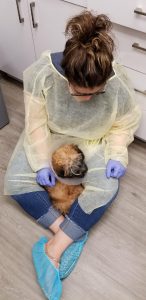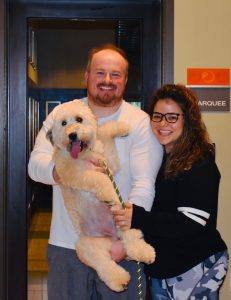Dedicated Pet Parents Bring Sophie to Advanced Veterinary Care Center in Davie!

Sophie as a new pup
When John Colombo and Melissa Seldin excitedly brought home a new 2-month-old puppy, they had no idea her little body was extremely sick. It turns out Sophie, their sweet Wheaten Terrier was about to undergo a fight for her life. “Our third day with Sophie we noticed she was not acting like herself,” says John. “By day five, she was just laying on the ground, not really moving. She would go potty (bloody diarrhea), take a few steps and fall down.” John and Melissa took Sophie to their family veterinarian where it was discovered she had both parvovirus and pneumonia. “They told us that Sophie could die if we didn’t get the best treatment,” adds John. “That’s when they recommended Advanced Veterinary Care Center in Davie.”

Melissa visits Sophie at AVCC
“We took her in shivering and shaking in a blanket. I think she had lost like two pounds and she was only seven pounds at the time,” says John. “Dr. Toll at AVCC met us at the door immediately to take Sophie into their care. Then, they sat us down to let us know what we were dealing with.” Sophie was suffering from both parvovirus and pneumonia. Testing later proved that she also had pneumovirus and bordatella infections both contributing to her bronchopneumonia. She was affected with severe vomiting, diarrhea, nasal discharge, extremely low white blood cell count, no appetite, and more. Sophie’s care was extensive and required nine days of hospitalization. “The doctors called us like clockwork with updates. And they were always honest, even if it wasn’t good news for that day,” adds John. At one point Sophie had almost no white blood cells and was very susceptible to infection. “Doctors were very concerned about her and they cared so much about her and about us. It wasn’t just about business. They are so good and I trust them. It’s very hard for me to find people that I trust.”

Sophie’s coat color changes as she gets older
Sophie’s care included: a nasoesophageal feeding tube, several broad spectrum antibiotics, GI protectants, anti-nausea medications, nebulization treatment, endotracheal wash, medications for discomfort and more. “Top to bottom, everyone at AVCC truly cares,” adds John. They really wanted to be a part of Sophie’s healing and see it through. You really feel comfortable there that you have the absolute best people on the job! They also accommodated us anytime day or night to visit her. Sometimes I would spend some time in the waiting room and I’d see a lot of dogs come in that would be in very bad shape. I would assure the owners, ‘this was the best place for you to bring them!'”

John and Melissa with Sophie
Sophie is doing great now and is fully recovered. She loves to run, swim and spend time at daycare with puppy friends. And, even though it’s been months since Sophie’s hospitalization at AVCC, she still likes to come back, visit and give some puppy love to the staff. “Honestly,” admits John, “They became like a family to us!”
To learn more about Advanced Veterinary Care Center and read other great pet stories, visit www.advetcc.com
About Canine Parvovirus
Canine parvovirus (parvo) is a very contagious virus that causes an infectious gastrointestinal illness in puppies and young dogs. With parvo, a seemingly healthy puppy can go from playful and vibrant to fatally ill. Most deaths from parvovirus occur within 3-5 days following the onset of clinical signs. Some of the signs of parvo include: lack of energy, loss of appetite, fever or low body temperature, severe (and often bloody) diarrhea, vomiting, abdominal pain and bloating and more. If you experience any of these or other symptoms it’s important to notify your family veterinarian immediately. The virus typically enters the body through oral and nasal exposure to contaminated feces from another infected dog. It can even spread from the hands and clothing of people who handle infected dogs. Parvo can survive in many environments for long periods of time. It is a preventable disease, but even vaccinated dogs are not 100% protected from the virus. Vaccines for parvovirus are given in various intervals by your family veterinarian.

